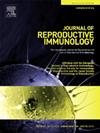mettl14介导的m6A修饰通过抑制SLC39A14调控子宫内膜容受性
IF 2.9
3区 医学
Q3 IMMUNOLOGY
引用次数: 0
摘要
子宫内膜容受性是一个为胚胎着床准备子宫内膜的复杂过程。子宫内膜容受性不足是着床失败的原因之一。本研究旨在探讨mettl14介导的SLC39A14 m6A修饰对子宫内膜间质细胞(ESCs)的影响。转染ESCs,进行CCK-8活力测定、EdU增殖试验和流式细胞术细胞周期和凋亡分析。western blotting检测自噬相关蛋白LC3、p62和Beclin-1。采用RIP检测METTL14蛋白与SLC39A14 mRNA的相互作用。采用Me-RIP检测SLC39A14的m6A水平。采用放线菌素D评价SLC39A14 mRNA的稳定性。METTL14过表达或SLC39A14敲低可增强ESCs的活力,促进增殖和细胞周期进程,抑制凋亡,降低LC3II/LC3I和Beclin-1水平,增加p62表达。METTL14结合SLC39A14 mRNA,增加SLC39A14 m6A修饰,降低SLC39A14 mRNA稳定性和SLC39A14蛋白表达。SLC39A14过表达消除了METTL14过表达对ESCs的影响。综上所述,METTL14通过抑制SLC39A14促进内皮细胞增殖,抑制细胞凋亡和自噬激活。本文章由计算机程序翻译,如有差异,请以英文原文为准。
METTL14-mediated m6A modification regulates endometrial receptivity by inhibiting SLC39A14
Endometrial receptivity is a complex process that prepares the endometrium for embryo implantation. Inadequate endometrial receptivity is one cause of implantation failure. This study aimed to explore the impact of METTL14-mediated m6A modification of SLC39A14 on endometrial stromal cells (ESCs). ESCs were transfected and subjected to CCK-8 viability assay, EdU proliferation assay, and flow cytometry cell cycle and apoptosis analyses. Autophagy-related proteins LC3, p62, and Beclin-1 were detected through western blotting. RIP was used to detect the interaction between METTL14 protein and SLC39A14 mRNA. Me-RIP was used to measure the m6A level of SLC39A14. Actinomycin D was used to assess the stability of SLC39A14 mRNA. METTL14 overexpression or SLC39A14 knockdown enhanced viability, promoted proliferation and cell cycle progression, restrained apoptosis, reduced LC3II/LC3I and Beclin-1 levels, and increased p62 expression in ESCs. METTL14 bound to SLC39A14 mRNA and increased SLC39A14 m6A modification, reducing SLC39A14 mRNA stability and SLC39A14 protein expression. SLC39A14 overexpression eliminated the effect of METTL14 overexpression on ESCs. In conclusion, METTL14 promotes proliferation and inhibits apoptosis and autophagy activation in ESCs by inhibiting SLC39A14.
求助全文
通过发布文献求助,成功后即可免费获取论文全文。
去求助
来源期刊
CiteScore
6.30
自引率
5.90%
发文量
162
审稿时长
10.6 weeks
期刊介绍:
Affiliated with the European Society of Reproductive Immunology and with the International Society for Immunology of Reproduction
The aim of the Journal of Reproductive Immunology is to provide the critical forum for the dissemination of results from high quality research in all aspects of experimental, animal and clinical reproductive immunobiology.
This encompasses normal and pathological processes of:
* Male and Female Reproductive Tracts
* Gametogenesis and Embryogenesis
* Implantation and Placental Development
* Gestation and Parturition
* Mammary Gland and Lactation.

 求助内容:
求助内容: 应助结果提醒方式:
应助结果提醒方式:


